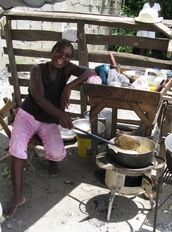 Leonie Leonie by Allison Archambault Despite enthusiastic adoption in other areas and local availability, the Miracle Stove (Réchaud Mirak in Creole) has not caught on in Les Anglais. People know about it, but few have tried it or seen it in use. The Miracle Stove is a simple modification to the widely used aluminum stove (réchaud tol in Creole). If the Aluminum stove looks something like a spaghetti strainer, the Miracle Stove looks like that spaghetti strainer in a bucket. Both stoves use charcoal (or alternative charcoal if available) and are used in the same way, but the Miracle Stove uses 25%-50% less charcoal than the traditional stove, a significant savings both in terms of fuel costs and pressure on the forest stock. Walking through one of the small weekday markets in town, we met Léonie who fries breadfruit, potatoes and dough to sell to market-goers. Cooking on a typical aluminum stove, she said she had heard of a miracle stove but had never tried one, and she agreed to try using a sample miracle stove from the store for a day. We returned at the end of the following day when she was packing up, and we were greeted with a giant smile. Léonie held up the bag that in the morning had contained one typical day’s worth of charcoal and showed us how, at the end of the day using the miracle stove, 25% of the charcoal was still left in the bag. She saw no downsides to the stove and was delighted to show off the savings – about 10 gourdes or $0.25 worth of charcoal, a significant sum when the going rate for a day’s labor is 100 gourdes. She asked to keep the stove for another day, and we agreed to leave it with her. We took pictures and the other women in the market crowded around to talk about the stove and the pictures. After only a day, Léonie had become a spokesperson for the miracle stove. She continues to use it as the field trial progresses.
0 Comments
Your comment will be posted after it is approved.
Leave a Reply. |
EarthSpark supporters make our work possible. Thank you for considering a donation towards eliminating energy poverty in Haiti.
Read the full blog - click here!
|
EarthSpark International is a non-profit 501(c)3 organization.
